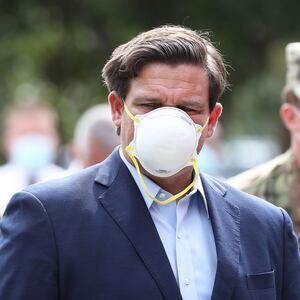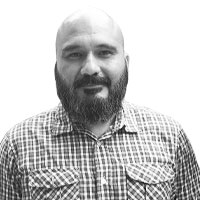HALLANDALE BEACH, Florida—John Pica leaned against the open driver's side door of his blue Jeep Wrangler, parked in a handicapped spot close to the entrance of the Big Easy Casino. It was early afternoon on Tuesday, and the 71-year-old with a full white beard was fiddling with a broken strap on his surgical face mask.
It was Pica’s second trip to the 70,000 square-foot gambling den since the Big Easy and other Broward County casinos reopened five days ago. “I was already inside but I had to leave because mine broke,” he groused to The Daily Beast.
That morning, Florida health department officials confirmed the state had logged a record 2,783 new coronavirus cases on June 15, marking it the third day in four that the state had 2,000 or more cases. Yet even though he’s in the age group most vulnerable to succumbing to COVID-19, the disease caused by the virus, Pica was elated to be hitting the electronic gaming machines. Despite the odds of being infected via person-to-person contact, Pica didn’t see a problem gambling with his health.
“There’s also the risk of dying at home alone,” he said. “They have good precautions here.”
Pica’s quest was just one window into how Floridians 65 and over have been quickly resuming leisure activities since state, county, and city officials began loosening lockdowns meant to slow the spread of COVID-19. Health experts generally agree that society cannot live in a state of perpetual lockdown. But they have consistently warned that senior citizens should be more vigilant about reigniting their social interactions, especially in states like Florida, Texas, and Arizona, that have seen their coronavirus trajectories veer off into the stratosphere in recent days.
Still, many Boomers seem determined not to spend their golden years in isolation, and are doing everything they can to live their best lives in this new reality—even if it means traversing a mushrooming outbreak.
Determined to go back inside the Big Easy, Pica rigged the mask so the strap stayed in place around his ears. "I'll probably play for a couple of hours," he said. “It’s not as busy as other casinos in Broward and I don't talk to anybody.”
Another Big Easy patron, 68-year-old Michael Duchon, said he stopped by to catch the morning horse-racing simulcast. "Of course I have some concerns, but I wanted to get out of my house,” Duchon said. “The casino was open and I like to play the horses.”
Walking into the Big Easy, players were greeted by signs on the glass doors, on the walls, and on advertising stands that instructed them to maintain a six-foot distance and to keep their masks on at all times. A digital thermometer read people's temperatures as they entered the main floor lined with rows of electronic gaming machines.
More than half of roughly 175 patrons were elderly, and some of the more frail-looking gamblers shuffled across the carpeted floor with the help of walkers and canes.
In the poker room, about half a dozen tables had the maximum number of six players. They sat elbow-to-elbow and in a semi-circle. Casino staff did not appear to be aggressively enforcing social distancing requirements, but they constantly wiped down empty machines. (The Big Easy on-duty floor casino manager did not immediately return a phone call requesting comment and the company that owns it did not respond to emailed questions prior to publication.)
Of course, casinos aren’t the only way Florida seniors are getting their rocks off.
Al Levy was anxious to make up for lost time on the greens. So he set up camp at the Trump National Doral Miami, among four golf courses the Trump Organization reopened shortly after Miami-Dade County allowed golfing facilities to resume operations.
“I started playing as much as I could,” the 65-year-old advertising company owner told The Daily Beast. “It’s been quite often. I’d say about 12 to 15 times.”
Following his most recent 18-hole round this past Saturday, Levy and his three golfing buddies ventured to a nearby pizzeria for their first sit-down dining experience since March. “The tables were spread six feet apart, but we were the only ones inside,” he said. “We had to wear masks going into the restaurant, but took them off when we were eating. Our server also wore a mask and gloves.”
The same day, June 13, Florida health officials reported 2,340 new positive COVID-19 cases, which at the time was the most recorded in the Sunshine State since the pandemic began. Of the total 80,109 Floridians who have tested positive, roughly 44 percent (nearly 35,273) had been identified as coming into contact with a person who had the disease.
Despite the sobering statistics, Levy was ambivalent about the health risks for people his age and older, who account for 20 percent of Florida’s 21.4 million residents. “I am not more or less concerned,” he said. “I try to do what you are supposed to do such as wearing a face-mask whenever possible, and maintaining my social distance.”
On his golf outings, he rides alone in a golf cart, opposing players keep their distance, and no one touches the flagstick, the marker inside each golf hole, Levy explained.
The people getting sick, he argued, are individuals attending large gatherings such as recent George Floyd protests and going to dining establishments or public places where social distancing and face coverings are not being enforced. “Those individuals are just asking for trouble,” Levy said. (There has been no clear evidence so far of COVID-19 surges tied to Black Lives Matter protests, despite epidemiological concerns about them.)
Experts suggested seniors were trying to walk an impossible line.
“When you have the level of infection Florida has and, in particular, Miami-Dade has, you should be acting like everybody is infected,” said Dr. William Haseltine, chair of the US-China Health Summit. “It is possible to have a life that is not completely restricted, but you have to be extraordinarily careful.”
Haseltine, who played a key role in the U.S response to the HIV/AIDS and anthrax crises, said seniors who engage in social activities must have situational awareness about being in an enclosed space, how big the space is, how many people are in the space, how many of those individuals are not wearing masks, how long they are going to be in the space, and the positive infection rate of their community.
“If they can’t factor any of those things, they are putting themselves and everybody they love at risk,” Haseltine said.
Kathleen C. Brown, a University of Tennessee public health professor and epidemiologist, put it more simply: People 65 and older should continue staying at home and limiting contact with people who don’t live with them. “We haven’t made enough progress to assume the risk is low,” she told The Daily Beast.
“But it’s a tough call,” she added, of politicians easing restrictions. “At some point, you have to make that decision to reopen knowing that when we put people back together, we will see more cases.”
Under the reopening guidelines set forth by Gov. Ron DeSantis, senior citizens and people with serious medical conditions can leave their homes to “obtain or provide open services or conduct open activities.”
Jon Schmidt, a 65-year-old Miami-Dade drug court advocate, said he was still taking a more cautious approach. “I don’t go out if I don’t have to,” he said. “I am paranoid. I don’t want to get this shit and die.”
Schmidt’s friend, 68-year-old harmonica player Williee Armenelli, has been a little more adventurous. A resident of Miami Springs, home to the Florida nursing facility with the most COVID-19 deaths in the state, Armenelli said he had a drink and listened to live music in the town’s golf and country club on a Saturday night two weeks ago.
“As a casual observer sitting in the corner, I could see how six feet can easily become six inches when you’re drinking,” he said. “Social distancing just doesn’t work in a bar atmosphere.”
Last week, on different occasions, Gov. DeSantis told reporters the state’s ominous trend-lines were a product of more testing and isolated outbreaks in nursing homes, prisons, and farming communities. DeSantis has also pointed to a low overall positive rate despite the surge in new cases. On Saturday, the state’s positive rate was 4.42 percent, the lowest in five days; on Monday, it shot up to 7.46 percent.
“There was just a big case dump in north central Florida where there's a watermelon farm,” DeSantis said during a public appearance in Coral Gables on Friday, according to a local news station. “These are workers that are working close together. Once one gets it, it tends to spread very rapidly.”
DeSantis also said fewer people were going to the hospital: “From the Memorial Day weekend, I looked from the 24th to today. Miami-Dade COVID hospitalizations are down 13 percent.”
At least one state health department official supported the governor’s explanations.
“The increase in positive cases is a result of Florida’s greatly expanded efforts in testing for COVID-19,” said Raul Pino, the health officer in Orange County, which had 3,130 positive cases as of Sunday and is home to theme parks like Universal Studios that recently reopened. “However, it’s important to note that the overall positivity rate remains low. In Orange County, our current overall positivity rate is 3.0%.”
Still, Todd Husty, the emergency management department medical director for Seminole County, which neighbors Orange, acknowledged the spike was partly due to Floridians not taking precautions seriously. “The problem is not everybody believes in or respects the idea of wearing a face-mask,” Husty said. “This virus only knows one thing: how to spread.”
Husty, who is 68, said he had a staff meeting at a local restaurant for the first time since the pandemic hit last week. The medical director noticed their server was not wearing a mask, so he handed her a spare N95 he had with him, he recalled. He and his co-workers were wearing masks until their food was served.
“She came back to the table without wearing the mask I gave her,” Husty said. “When I asked her why, she said her employer told her it was optional. Well, for me it’s not optional. To her credit, she put on the mask after that. But I probably won’t be going back to that restaurant for a long time.” (In Seminole County, officials do not require restaurant employees to wear face coverings while at work.)
Back in Doral, Levy said he was not scared about resuming life under the “New Normal,” the term Miami-Dade government officials use to describe the COVID-19 regulations residents and businesses must abide by. In addition to his golf outings, he and his wife have visited their two adult daughters and grandchildren a few times over the last six weeks, he said.
“It was a very odd experience at first because we wore masks and there was no hugging or kissing,” Levy said. “The visits usually only last about 20 to 30 minutes because the grandkids don’t really understand the social distancing. They want to climb all over you and it’s very difficult to say no.”
The couple have still not gone out to dinner with their friends or attended any parties, Levy said. “Some of our friends are really not ready to go out and socialize as of yet,” he said.
But, he added: “I still have to live my life.”



